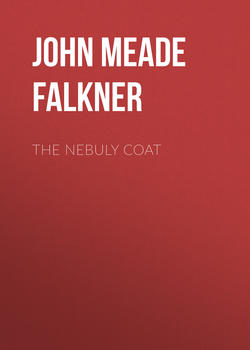Читать книгу The Nebuly Coat - John Meade Falkner - Страница 8
Chapter Seven
ОглавлениеMiss Euphemia Joliffe devoted Saturday afternoons to Saint Sepulchre’s Dorcas Society. The meetings were held in a class-room of the Girls’ National School, and there a band of devoted females gathered week by week to make garments for the poor. If there was in Cullerne some threadbare gentility, and a great deal of middle-class struggling, there was happily little actual poverty, as it is understood in great towns. Thus the poor, to whom the clothes made by the Dorcas Society were ultimately distributed, could sometimes afford to look the gift-horse in the mouth, and to lament that good material had been marred in the making. “They wept,” the organist said, “when they showed the coats and garments that Dorcas made, because they were so badly cut;” but this was a libel, for there were many excellent needlewomen in the society, and among the very best was Miss Euphemia Joliffe.
She was a staunch supporter of the church, and, had her circumstances permitted, would have been a Scripture-reader or at least a district visitor. But the world was so much with her, in the shape of domestic necessities at Bellevue Lodge, as to render parish work impossible, and so the Dorcas meeting was the only systematic philanthropy in which she could venture to indulge. But in the discharge of this duty she was regularity personified; neither wind nor rain, snow nor heat, sickness nor amusement, stopped her, and she was to be found each and every Saturday afternoon, from three to five, in the National School.
If the Dorcas Society was a duty for the little old lady, it was also a pleasure—one of her few pleasures, and perhaps the greatest. She liked the meetings, because on such occasions she felt herself to be the equal of her more prosperous neighbours. It is the same feeling that makes the half-witted attend funerals and church services. At such times they feel themselves to be for once on an equal footing with their fellow-men: all are reduced to the same level; there are no speeches to be made, no accounts to be added up, no counsels to be given, no decisions to be taken; all are as fools in the sight of God.
At the Dorcas meeting Miss Joliffe wore her “best things” with the exception only of head-gear, for the wearing of her best bonnet was a crowning grace reserved exclusively for the Sabbath. Her wardrobe was too straightened to allow her “best” to follow the shifting seasons closely. If it was bought as best for winter, it might have to play the same rôle also in summer, and thus it fell sometimes to her lot to wear alpaca in December, or, as on this day, to be adorned with a fur necklet when the weather asked for muslin. Yet “in her best” she always felt “fit to be seen”; and when it came to cutting out, or sewing, there were none that excelled her.
Most of the members greeted her with a kind word, for even in a place where envy, hatred and malice walked the streets arm in arm from sunrise to sunset, Miss Euphemia had few enemies. Lying and slandering, and speaking evil of their fellows, formed a staple occupation of the ladies of Cullerne, as of many another small town; and to Miss Joliffe, who was foolish and old-fashioned enough to think evil of no one, it had seemed at first the only drawback of these delightful meetings that a great deal of such highly-spiced talk was to be heard at them. But even this fly was afterwards removed from the amber; for Mrs Bulteel—the brewer’s lady—who wore London dresses, and was much the most fashionable person in Cullerne, proposed that some edifying book should be read aloud on Dorcas afternoons to the assembled workers. It was true that Mrs Flint said she only did so because she thought she had a fine voice; but however that might be, she proposed it, and no one cared to run counter to her. So Mrs Bulteel read properly religious stories, of so touching a nature that an afternoon seldom passed without her being herself dissolved in tears, and evoking sympathetic sniffs and sobs from such as wished to stand in her good books. If Miss Joliffe was not herself so easily moved by imaginary sorrow, she set it down to some lack of loving-kindness in her own disposition, and mentally congratulated the others on their superior sensitiveness.
Miss Joliffe was at the Dorcas meeting, Mr Sharnall was walking by the riverside, Mr Westray was with the masons on the roof of the transept; only Anastasia Joliffe was at Bellevue Lodge when the front-door-bell rang. When her aunt was at home, Anastasia was not allowed to “wait on the gentlemen,” nor to answer the bell; but her aunt being absent, and there being no one else in the house, she duly opened one leaf of the great front-door, and found a gentleman standing on the semicircular flight of steps outside. That he was a gentleman she knew at a glance, for she had a flair
